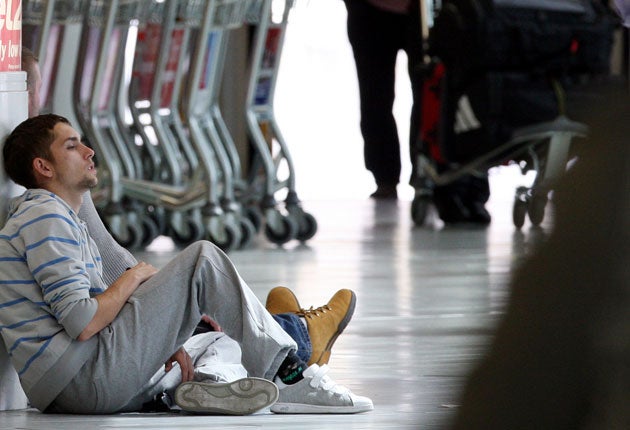Airlines furious at move to close airports again

Your support helps us to tell the story
This election is still a dead heat, according to most polls. In a fight with such wafer-thin margins, we need reporters on the ground talking to the people Trump and Harris are courting. Your support allows us to keep sending journalists to the story.
The Independent is trusted by 27 million Americans from across the entire political spectrum every month. Unlike many other quality news outlets, we choose not to lock you out of our reporting and analysis with paywalls. But quality journalism must still be paid for.
Help us keep bring these critical stories to light. Your support makes all the difference.
British airlines reacted with fury last night as widespread flight bans were imposed across the UK after more volcanic ash was blown south from Iceland.
London's Heathrow and Gatwick airports were the latest hubs affected by a rapidly-spreading no-fly zone that saw all flights from both airports grounded until at least 7am today.
With the volcanic ash spreading south east from Iceland, the controversial measures imposed by the Civil Aviation Authority (CAA) had earlier effected numerous hubs in Northern Ireland and the UK including Manchester, Liverpool, Carlisle, Doncaster, Humberside and East Midlands airports.
Critics included Virgin Atlantic president, Sir Richard Branson, who branded the closure of Manchester "beyond a joke", and joined British Airways in attacking the restrictions imposed by the CAA.
Airlines are still coming to terms with the havoc caused by the five-day ban on flights imposed across Europe last month. It is thought to have cost the industry at least £1.15bn.
Sir Richard said: "All the test flights by airlines, aircraft and engine manufacturers have shown no evidence that airlines could not continue to fly completely safely. It is obviously dangerous to fly through the mouth of a volcano. But the volcano is hundreds of miles away from the UK. More than 1,000 flights took off from France last week in similar conditions to that which exist in Manchester today without encountering any problems or showing any levels of ash concentration."
But British Airways, who is set to appeal to the high court for an injunction against a proposed 20-day cabin crew strike starting tomorrow, the restrictions only served to compound its problems. The airline is set for face-to-face talks with Unite trade union this afternoon.
Yesterday the airline described the CAA's regulations as "overly restrictive" and "not justified". A spokesman said it had "no confidence" in the theoretical model used to assess the spread of ash. He said: "The airline industry has a great deal of experience in dealing safely with the potential risk posed by volcanic ash.
"British Airways has operated for many years in areas of volcanic activity, and we believe airlines are best placed to take the final decisions on whether or not it is safe to fly. Safety will always be our over-riding priority." But the CAA expressed surprise at the comments, saying airlines had backed the present system of regulations at a major industry conference on the subject only last week. A spokesman said: "[Sir Richard] is giving the indication it's for Government and regulators to do something. But we can't do that; we don't have test facilities, we don't operate these engines.
"We need the airlines and the manufacturers to work together to provide us with evidence engines can take a higher level of ash. Until they come back to us with a new figure there's nothing we can do. We as a regulator can't turn round and say, 'Oh, I'm sure it will be safe, go on'."
The previous ban on flights ended when the CAA upped its safety threshold of volcanic ash from zero to 0.002g per cubic metre of air. A Met Office spokesman, Barry Gromett, said favourable conditions mean the restrictions should be "much shorter than last time", with prevailing south-westerly winds expected to have blown the ash away from the UK by Wednesday.
Join our commenting forum
Join thought-provoking conversations, follow other Independent readers and see their replies
Comments